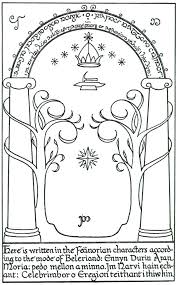The Two Towers by J.R.R Tolkien (Harper Collins 1991, 2007) pp. 734-744
The smoking of pipes at the ruined gates of Isengard had created a quiet mood in which nothing is said but Legolas is anxious to know more about the story of the hobbits after their capture by orcs nine days before. Merry and Pippin spoke of their experience with the Uruk-hai and how they were able to escape amidst the confusion of battle when Éomer’s company attacked. As Gimli said about how Pippin was able to cut his bonds with an orc knife at an earlier point in the story the hobbits were lucky but they were able to seize their luck “with both hands”.

Inger Idelfelt imagines Merry and Pippin as prisoners of the orcs.
Merry and Pippin went on to speak of their meeting with Treebeard and of Entmoot when the Ents discussed what action they should take against Saruman. Then they spoke of how, at the end of their debate, the Ents “suddenly blew up”, of how they marched upon Isengard, and of how they were followed by huorns who came out of the forest behind them.

The Ents avenge destruction of the natural world such as this.
They spoke of how, as they reached Nan Curunir, the vale of the wizard, they were met by a tremendous sound of trumpets blaring and thought that they had been discovered by their enemies. But then they had realised that the noise was of the emptying of Isengard as Saruman sent his army to war against Rohan and how for an hour they watched them marching southward towards Helm’s Deep.
Treebeard watched them go and then said to Merry and Pippin, “My business is with Isengard tonight, with rock and stone”.
Tolkien describes how the Ents launched their assault upon the fortress, wonderfully showing how the slow, deliberate action of tree roots over a hundred years, an action about which all householders must be aware, was concentrated into a single night’s furious work.
“They pushed, pulled, tore, shook and hammered; and clang-bang, crash-crack, in five minutes they had these huge gates just lying in ruin; and some were already beginning to eat into the walls, like rabbits in a sand-pit.”
Merry and Pippin go on to describe how the destruction continues, how Saruman tried to respond by means of fire from within his impregnable fastness of Orthanc at the heart of Isengard; and how the Ents diverted the waters of the Isen from its natural course and flooded the fortress, turning Orthanc into an island in the centre of a lake, an island in which Saruman was now a prisoner.
I have already spoken of how, in this powerful piece of description, Tolkien shows how the action of a forest upon a house over many years is concentrated within a single night. We know that if any building is neglected for a period of time nature soon reclaims it, drawing it back into itself as what once seemed to be permanent is shown to be merely temporary. Tolkien did not know of James Lovelock’s Gaia hypothesis, in which Lovelock suggested that the earth is a complex self-regulating system within which that which is organic and non-organic interacts in order to maintain the system as a whole but I suspect that he may have been inclined to like it if he did. Many scientists have criticised the hypothesis on the basis that it is teleological, in other words that it is descriptive of a set of conditions that will lead to a particular end, in this case about the survival of planet earth as a place for organic life, but Tolkien was a Christian, and Christians believe that everything is moving towards a conclusion, of a new heaven and a new earth.
In his Music of the Ainur Tolkien places the whole history of the earth within the framework of a single piece of music in which all creatures, both earthly and heavenly are active participants. Only Eru Ilúvatar, only God, knows how the music will end but it will be a beautiful resolution of all that has preceded that end. As the 14th century English mystic, Julian of Norwich put it, “All shall be well”. There may be a time in which figures like Saruman may triumph but as the Ents show, through their business with the rock and stone of Isengard, they cannot triumph forever.

Ted Nasmith depicts the destruction of Isengard by the Ents.




















